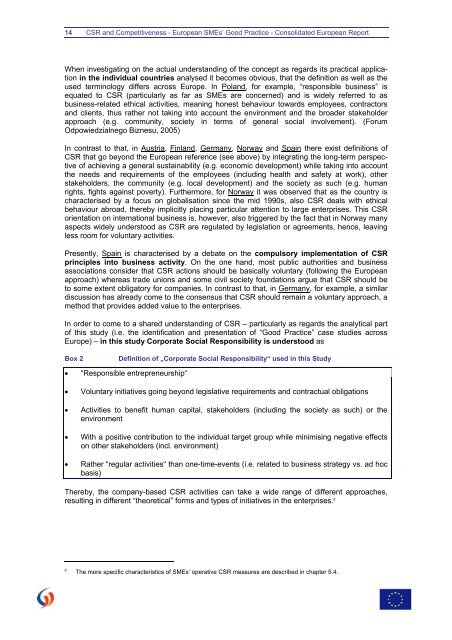CSR and Competitiveness European SMEs - KMU Forschung Austria
CSR and Competitiveness European SMEs - KMU Forschung Austria
CSR and Competitiveness European SMEs - KMU Forschung Austria
Create successful ePaper yourself
Turn your PDF publications into a flip-book with our unique Google optimized e-Paper software.
14 <strong>CSR</strong> <strong>and</strong> <strong>Competitiveness</strong> - <strong>European</strong> <strong>SMEs</strong>’ Good Practice - Consolidated <strong>European</strong> Report<br />
When investigating on the actual underst<strong>and</strong>ing of the concept as regards its practical application<br />
in the individual countries analysed it becomes obvious, that the definition as well as the<br />
used terminology differs across Europe. In Pol<strong>and</strong>, for example, “responsible business” is<br />
equated to <strong>CSR</strong> (particularly as far as <strong>SMEs</strong> are concerned) <strong>and</strong> is widely referred to as<br />
business-related ethical activities, meaning honest behaviour towards employees, contractors<br />
<strong>and</strong> clients, thus rather not taking into account the environment <strong>and</strong> the broader stakeholder<br />
approach (e.g. community, society in terms of general social involvement). (Forum<br />
Odpowiedzialnego Biznesu, 2005)<br />
In contrast to that, in <strong>Austria</strong>, Finl<strong>and</strong>, Germany, Norway <strong>and</strong> Spain there exist definitions of<br />
<strong>CSR</strong> that go beyond the <strong>European</strong> reference (see above) by integrating the long-term perspective<br />
of achieving a general sustainability (e.g. economic development) while taking into account<br />
the needs <strong>and</strong> requirements of the employees (including health <strong>and</strong> safety at work), other<br />
stakeholders, the community (e.g. local development) <strong>and</strong> the society as such (e.g. human<br />
rights, fights against poverty). Furthermore, for Norway it was observed that as the country is<br />
characterised by a focus on globalisation since the mid 1990s, also <strong>CSR</strong> deals with ethical<br />
behaviour abroad, thereby implicitly placing particular attention to large enterprises. This <strong>CSR</strong><br />
orientation on international business is, however, also triggered by the fact that in Norway many<br />
aspects widely understood as <strong>CSR</strong> are regulated by legislation or agreements, hence, leaving<br />
less room for voluntary activities.<br />
Presently, Spain is characterised by a debate on the compulsory implementation of <strong>CSR</strong><br />
principles into business activity. On the one h<strong>and</strong>, most public authorities <strong>and</strong> business<br />
associations consider that <strong>CSR</strong> actions should be basically voluntary (following the <strong>European</strong><br />
approach) whereas trade unions <strong>and</strong> some civil society foundations argue that <strong>CSR</strong> should be<br />
to some extent obligatory for companies. In contrast to that, in Germany, for example, a similar<br />
discussion has already come to the consensus that <strong>CSR</strong> should remain a voluntary approach, a<br />
method that provides added value to the enterprises.<br />
In order to come to a shared underst<strong>and</strong>ing of <strong>CSR</strong> – particularly as regards the analytical part<br />
of this study (i.e. the identification <strong>and</strong> presentation of “Good Practice” case studies across<br />
Europe) – in this study Corporate Social Responsibility is understood as<br />
Box 2 Definition of „Corporate Social Responsibility“ used in this Study<br />
• “Responsible entrepreneurship“<br />
• Voluntary initiatives going beyond legislative requirements <strong>and</strong> contractual obligations<br />
• Activities to benefit human capital, stakeholders (including the society as such) or the<br />
environment<br />
• With a positive contribution to the individual target group while minimising negative effects<br />
on other stakeholders (incl. environment)<br />
• Rather “regular activities“ than one-time-events (i.e. related to business strategy vs. ad hoc<br />
basis)<br />
Thereby, the company-based <strong>CSR</strong> activities can take a wide range of different approaches,<br />
resulting in different “theoretical” forms <strong>and</strong> types of initiatives in the enterprises. 8<br />
8 The more specific characteristics of <strong>SMEs</strong>’ operative <strong>CSR</strong> measures are described in chapter 5.4.




